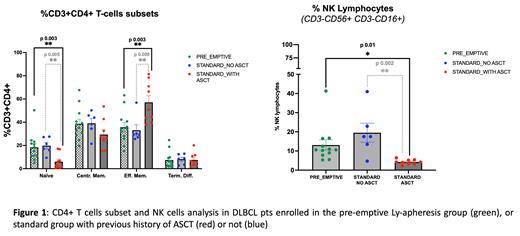Background
Chimeric antigen receptor T (CAR-T) cells are an effective therapy in Diffuse large B-cell Lymphoma (DLBCL). However, more than half of patients (pts) still relapse. CAR-T cells from T-lymphocytes (T-Ly) enriched for early lineage T-cells have shown higher replicative potential and better efficacy. Recent studies have also shown that NK cells may enhance CAR-T cells antitumor efficacy by enhancing immune/tumor cells cluster formation and improving CAR-T cells fitness. In the BioCART BS study, we assessed the T-cell subpopulations and NK cells at Ly-apheresis evaluating the impact of previous treatments.
Methods
Since April 2021, 27 DLBCL pts underwent Ly-apheresis at our Center. In Italy, until now, DLBCL pts are eligible to CAR-T cells therapy if relapsed/refractory after at least two lines of treatments. Since cryopreservation of the apheresed Ly is allowed for Tisa-cel, DLBCL pts with poor prognostic risk factor (primary refractory; PET positivity before Autologous Stem Cell Transplantation [ASCT]; relapse within 12 months) were enrolled in a “pre-emptive” Ly-apheresis program, scheduling leukapheresis as soon as possible.
Combinations of monoclonal antibodies were used by Flow Cytometry to evaluate the CD4/CD8 ratios and T-cell subset percentages and counts. In particular of CD45RA+CCR7+ Naïve (N), CD45RA-CCR7+ Central Memory (CM), CD45RA-CCR7- Effector Memory (EM), and CD45RA+CCR7- Terminally Differentiated (TD) cells. NK cells were defined as CD3-CD56+/CD3-CD16+ cells.
CAR-T cells expansion was evaluated using specific CD19 CAR reagent. All stained samples were acquired on a Canto II (BD Bioscience) flow cytometer and analyzed using DIVA software version 9.0.
The CAR-T cells therapy response was evaluated at 30 days post infusion by CT or PET scan.
Results
12 out of the 27 (44.4%) DLBCL pts underwent pre-emptive Ly-apheresis: 3 pts were primary refractory, 7 had PET+ before ASCT, while 2 relapsed within 1 year from the end of treatment program. Conversely, 15 pts were enrolled in the standard program, after at least two lines of treatment. The latter have been divided into 2 groups: pts who had received ASCT (n=9) and those who did not (n=6). At baseline, no clinical differences have been observed between the three groups. The median age was 61 years (29-73), while most pts had IPI >2 (68%) and Ann Arbor score>2 (82%).
Comparing T-cell subpopulations at Ly-apheresis, pts who previously underwent ASCT presented a more “exhausted” T-Ly profile (Figure 1). Indeed, they displayed lower CD4/CD8 ratios compared with both the pre-emptive (p 0.03) and standard group without a history of ASCT (p 0.003). In addition, ASCT results in lower CD4+ Naïve T cells, both as percentage of parental cells and as absolute count, compared to the other two groups (p 0.003 and 0.005 for the pre-emptive group, p 0.005 for the group without previous ASCT). Conversely, pts who underwent ASCT had higher percentages and absolute counts of CD4+ EM T-Ly than pts in the pre-emptive group (p 0.003 and 0.05, respectively). They had also lower CD8+ Naïve T cells compared with those pts in the standard group who did not receive ASCT, while they displayed a trend towards increased absolute counts of highly differentiated CD8+ cells.
Considering the NK-cells, pts who underwent ASCT had lower percentages of NK cells compared with pts of the pre-emptive group, as well as the standard group not receiving ASCT (p 0.01 and 0.002, respectively). This may reduce the CAR-T cells antitumor efficacy and CAR-T cell fitness.
Of note, the T-Ly fitness impacts both on CAR-T cells expansion and efficacy. Indeed, pts who previously underwent ASCT less frequently had an adequate CAR-T cells expansion (“expander” pts: 25% vs. 75%) and a lower peak of CAR+ cells (4.5% vs. 21.9% CAR+ cells). In addition, pts who previously underwent ASCT displayed a lower, although not significant, complete remission rate at 30-days response compared with those pts who did not received it (20% vs. 44.4%).
Notably, 5 out of 12 (42%) pts in the pre-emptive group had already activated a CAR-T cell program, showing its feasibility.
Conclusion
ASCT before Ly-apheresis results in more “exhausted” T-Ly profile and lower NK cells proportion at the time of leukapheresis. Timely pre-ASCT Ly-apheresis, as well as the use of CAR-T in second line would help to collect more “fit” Ly enriched with NK cells, and this may result in higher CAR-T cells expansion and efficacy.
Disclosures
Polverelli:BMS: Honoraria; GSK: Honoraria; Abbvie: Honoraria; Novartis: Honoraria. Cattaneo:pfizer, jazz: Other: travel grants. Tucci:Eli Lilly: Other; Sanofi: Other; Gentili: Other; Janssen: Other; Takeda: Other; Kiowa Kiryn: Other; Beigene: Other. Malagola:Biotest, MSD: Consultancy, Honoraria. Re:Takeda: Membership on an entity's Board of Directors or advisory committees, Speakers Bureau; Incyte: Membership on an entity's Board of Directors or advisory committees; Italfarmaco: Membership on an entity's Board of Directors or advisory committees. Russo:Medac, Abbvie, MSD, Jazz Pharma, Gilead, Novartis: Membership on an entity's Board of Directors or advisory committees; MSD, Novartis, Gilead, BMS, Medac: Honoraria.


This feature is available to Subscribers Only
Sign In or Create an Account Close Modal